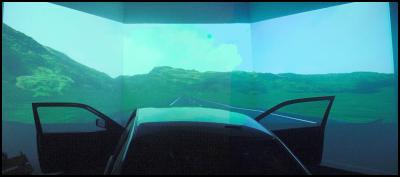New Simulator Takes On Deadly Business
New Simulator Takes On Deadly Business
It may look like an enormous video game but Waikato University's new driving simulator using a real BMW is part of a deadly serious business.
The new simulator, one of fewer than 20 of its type in the world and the first in this country, is based at New Zealand's premier road safety laboratory run by the traffic and road safety research group (TARS), part of the university's psychology department.
TARS staff say their road safety research, which includes advice to the Land Transport Safety Authority, Transit New Zealand, local roading authorities, and the police, will have clearly saved lives and prevented injuries.
"Our contribution to preventing death and injury is enormously satisfying because it helps stop suffering and saves taxpayers millions of dollars," says TARS psychologist Robert Isler.
Now the new simulator will significantly enhance the leading edge research undertaken by TARS. It gives test drivers a 180-degree view of the roads they are driving on. The simulator is equipped to use three-dimensional graphic images, road survey data and digital video to display real New Zealand roads, and test a variety of road safety improvements economically and safely.
"The wide field of view and use of an entire car makes the driving experience very realistic to test drivers," says Samuel Charlton, a TARS specialist in engineering psychology and driver performance. "This allows us to answer questions about driver attention and decision-making with greater precision and to create even safer roads. We are finding that sometimes the best road engineering solutions are inexpensive and simple, but they are not always the obvious solution."
Dr Isler says the upgrading of the simulator facility at Waikato University has been entirely funded by research contract income. "This means that money invested in past safety research is paying a dividend in terms of helping to purchase even better equipment."
ENDS



 NZ Airports Association: Airlines And Airports Back Visa Simplification
NZ Airports Association: Airlines And Airports Back Visa Simplification Netsafe: Statement From Netsafe About Proposed Social Media Ban
Netsafe: Statement From Netsafe About Proposed Social Media Ban The Reserve Bank of New Zealand: 2024 General Insurance Stress Test Results Published Today
The Reserve Bank of New Zealand: 2024 General Insurance Stress Test Results Published Today  Worldline: School Holidays And Long Weekends Change Regional Spending Patterns In April
Worldline: School Holidays And Long Weekends Change Regional Spending Patterns In April Stats NZ: Livestock Numbers Fall Over The Last 10 Years While Area Planted In Fruit Increases
Stats NZ: Livestock Numbers Fall Over The Last 10 Years While Area Planted In Fruit Increases Moths and Butterflies NZ Trust: Tagged Monarchs Found
Moths and Butterflies NZ Trust: Tagged Monarchs Found